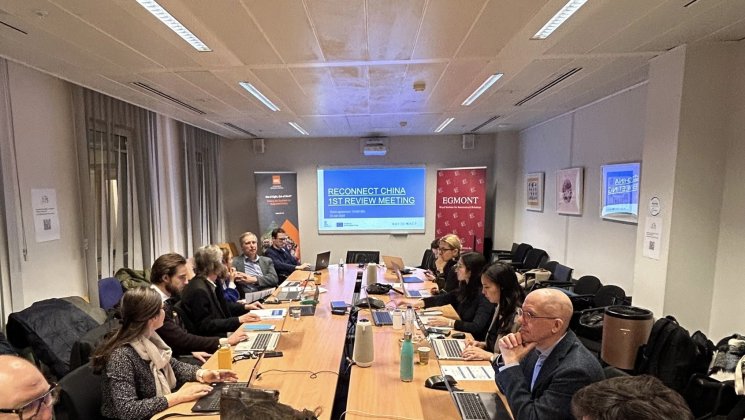Aasiale ja Lähis-Idale keskenduvad õppeained kevadsemestril 2022-2023
Põnevaid eesti- ja ingliskeelseid õppeaineid, mis tutvustavad Aasia ja Lähis-Ida kultuure, keeli, aga ka majandust ning poliitikaid, on kevadsemestril 2022-2023 Tartu Ülikoolis mitmeid. Siit ülevaatest leiab nii eesti- kui ingliskeelseid õppeaineid Aasia ja Lähis-Ida huvilistele.
Eestikeelsed ained on järgmised:
HVUS.06.003 Judaismi eetika
Õppejõud: Anu Põldsam
Vaadelda lähemalt alates 19. sajandi lõpust judaismis aset leidnud muutusi ja nende seost "välismaailma", tehnoloogia ja mõtteloo arengutega.
USUS.08.020 Juudi identiteet antiikajast tänapäevani
Õppejõud: Anu Põldsam
Käsitleda ajaloo lõikes lähemalt juutide enesemõistmist, selle kujunemist ning muutumist ja ühtlasi juudi identiteedi kujundamist väljapoolt.
USUS.08.025 Islami sisemine pluralism
Õppejõud: Helen Haas, Elo Süld
Aine tutvustab islami sees eksisteerivaid erinevaid religioosseid suundasid, nende kujunemist, aluspõhimõtteid ja nende omavahelisi seoseid.
USUS.00.018 Igapäevane islam: uskumused, tavad, kombed
Õppejõud: Helen Haas, Elo Süld
Aine avab islamimaailma kultuurilise mitmekesisuse tausta: annab ülevaate moslemi elukaare tähtsamatest sündmustest (sünd, ümberlõikamine, abielu, surm); selgitab suuremaid religioonist tulenevaid erinevusi islami- ja läänemaailma vahel
USUS.06.140 India usundid
Õppejõud: Erki Lind, Ain Riistan
Õppeaine eesmärgiks on anda süsteemne ülevaade India usundiloost, peamiselt tähtsamatest Indias tekkinud religioonidest (Induse kultuuri religioon, hinduism, budism, džainism, sikhism, parside usund, islami ja kristluse saabumine) nende ajaloolises arengus.
FLLC.08.005 Jaapani ajalugu
Õppejõud: Ene Selart
Kursuse eesmärgiks on anda ülevaade Jaapani ajaloo erinevatest ajastutest ja ühiskonna iseloomulikest arengujoontest. Lisaks analüüsitakse põhjalikumalt tähtsamaid sündmuseid ning nendega kaasnenud kultuurinähtusi.
HVLC.08.008 Jaapani keel algtasemele I, tase 0 > A1.1
Õppejõud: Eri Miyano
Kursuse eesmärgiks on omandada jaapani keele elementaarsed oskused nii kõnes kui kirjas. Arendatakse kõiki osaoskusi. Üldeesmärkide saavutamise lõpptase on A1.1.
HVLC.08.009 Jaapani keel algtasemele II, tase A1.1 > A1.2
Õppejõud: Eri Miyano
Kursuse eesmärgiks on omandada jaapani keele elementaarsed oskused nii kõnes kui kirjas. Arendatakse kõiki osaoskusi. Üldeesmärkide saavutamise lõpptase on A1.2.
HVLC.08.011 Jaapani keel eelkesktasemele I, tase A2.1 > A2.2
Õppejõud: Eri Miyano
Kursuse eesmärgiks on süvendada "Jaapani keele algkursus III" jooksul omandatud teadmisi ja oskusi nii kõnes kui kirjas. Arendatakse kõiki osaoskusi. Üldeesmärkide saavutamise lõpptase on B1.1
USUS.05.067 Heebrea keel
Õppejõud: Anu Põldsam
Kursuse eesmärgiks on anda tudengile baasteadmised heebrea keelest, mis on vajalikud Heebrea Piibli (Vana Testament) lugemiseks: tutvustada heebrea keele ajalugu, grammatikat ja morfoloogiat, et tudeng suudaks sõnaraamatu ja õppematerjalide abiga lugeda ning tõlkida Heebrea Piibli lihtsamaid proosa- ja luuletekste.
Täpsem info on olemas ÕIS2-s.
Ingliskeelsed kursused on järgmised:
USUS.08.023 Cultural and Religious Roots of the Middle East
Lecturers: Anu Põldsam, Urmas Nõmmik, Elo Süld, Vladimir Sazonov, Priit Rohtmets
The main objective of the course is to introduce students to the wide-reaching relevance of historical-cultural influences and of religion to the character and composition of societies in the Middle East since antiquity. Through a wide chronological and geographical lens, students will gain insight into the roles and dynamics that religion plays in modern societies in the Middle East. The aim of the course is also to show how religious and temporal power are contingent on the cultural contexts in which they emerge and to introduce these contexts to the students.
HVUS.06.006 Society, Religion and Politics in the Contemporary Middle East
Lecturer: Helen Haas, Elo Süld, Vladimir Sazonov, Anu Põldsam, Maili Vilson
The main objectives of the course are to:
1) give a review of different political models in Middle East and North Africa,
2) describe the dynamics of Middle Eastern and North African political regimes and movements and their peculiarities,
3) assess current changes in political and social settings of Islamic societies and the role of religion in them,
4) substantiate the correspondence of political and social outcomes and cultural and religious reasons.
HVLC.08.012 Chinese for Beginners I (on the Basis of English), Level 0 > A1.1
Lecturer: Mart Tšernjuk
Mastering the basics of spoken and written Modern Standard Chinese (Mandarin). It contains: (1) basic rules for pronunciation; (2) using Chinese phonetic alphabet (pinyin) for writing Chinese words; (3) basic rules and principles of Chinese characters (hanzi/kanji); (4) mastering the elementary vocabulary and speech patterns in speech and writing.
HVLC.08.013 Chinese for Beginners II (on the Basis of English), Level A1.1 > A1.2
Lecturer: Mart Tšernjuk
Mastering the basics of modern spoken and written Chinese (Mandarin). Practicing reading, conversation (in the limits of topics and vocabulary given in the textbook), and writing characters; learning the basic rules of grammar and syntax of the Chinese language.
HVLC.08.014 Chinese for Beginners III (on the Basis of English), Level A1.2 > A2.1
Lecturer: Mart Tšernjuk
After passing the course, students can
commnicate in Chinese at the elementary primary level read adapted texts
write and recognize ca 800 characters of everyday use.
USUS.06.143 Classical Arabic B
Lecturer: Imar Yacine Koutchoukali
Through the course, the student will deepen their understanding of Classical Arabic grammar. At the end of the semester, the student will have gained a deeper understanding of Classical Arabic phonology, morphology, and syntax.
FLLC.08.008 Korean History (on the Basis of English)
Lecturer: Jung Ran Park
This course will seek to provide students a broad understanding of Korean history, By doing so, it is hoped that students will gain an appreciation of the diversity of Korean history and the various people who lived it.
HVLC.08.016 Korean for Beginners I (on the Basis of English), Level 0 > A1.1
Lecturer: Jung Ran Park
This course aims to develop basic linguistic skills in Korean. Students will learn and practice fundamental vocabulary and grammar in order to talk about their daily life. They will understand and use Korean better by carrying out simple communicative activities and tasks.
HVLC.08.017 Korean for Beginners II (on the Basis of English), Level A1.1 > A1.2
Lecturer: Jung Ran Park
This course aims to develop basic linguistic skills in Korean. Students will learn and practice fundamental vocabulary and grammar in order to talk about their daily life. They will understand and use Korean better by carrying out simple communicative activities and tasks.
HVLC.08.018 Korean for Beginners III (on the Basis of English), Level A1.2 > A2.1
Lecturer: Jung Ran Park
This course aims to develop speaking skills in Korean language by focusing on general topics of daily life.
SVJS.00.002 Political Development in East and Southeast Asia
Lecturers: Chueiling Shin (visiting lecturer in Asian Politics)
This course will provide a comparative study of political developments in East and Southeast Asia since the 20th century in the context of ethnic and cultural differences, and democratic and economic development. The course has two main objectives, firstly to understand the characteristics of East Asia regimes and secondly to explore alternative options for democratisation in the region.
SVMJ.07.004 Doing business in Asia - theory and practice
Lecturers: Tiia Vissak, Liisi Karindi
he general aim of the course is to create skills needed to operate in the globalised economy. The objective is to develop for students a basic knowledge about the international business, with the clear focus on the Asian region. The course gives an understanding about other firms' business practices in Asia and Asian firms' business practices in other countries. This course is especially relevant for the students, future employees of private and public firms, which are doing different type of business in Asia. It is useful also for the wider audience in order to understand specificity of Asian business environment and practices.a
SVMJ.07.008 Business Mindsets in East Asia
Lecturers: Eva Liias
In pace with the increasing importance of emerging markets in nowadays' global economy, this course aims to provide students with comprehensive knowledge of mindset development in East Asian cultures and its reflections in business behaviors and management. The focus is particularly on China, South Korea and Japan.
Further information is found in SIS.



